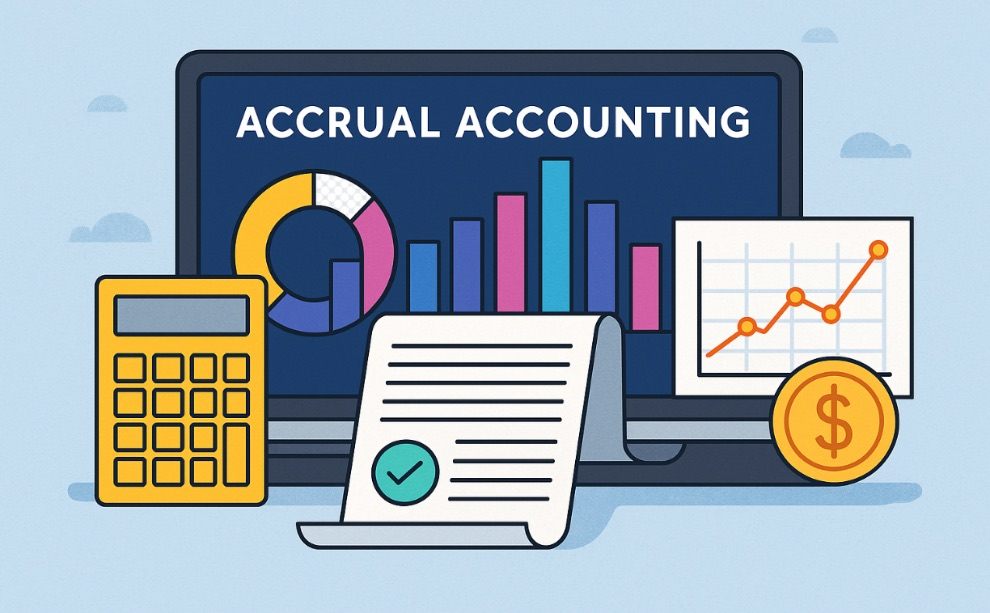
Accrual Accounting: Why Your Business Might Need it More than You Think
For many business owners, especially those starting out, accounting is an afterthought. Revenue goes in, expenses go out, and the hope is that there’s something left at the end. But as companies grow, the need for accurate financial insight becomes not just helpful—it becomes essential. That’s where accrual accounting comes into play.
While cash-based accounting might work for freelancers or micro-businesses, accrual accounting offers a far more complete and forward-looking picture of your company’s financial health. In fact, many mid-sized and large enterprises are legally required to use it. But even if it’s not a mandate, there are plenty of reasons why accrual accounting might be the smart move.
What Is Accrual Accounting?
At its core, accrual accounting records revenues and expenses when they are earned or incurred, not when the cash actually changes hands. This is in direct contrast to cash accounting, which only logs transactions when money physically enters or exits your accounts.
Let’s say you deliver a service in June but don’t receive payment until July. With cash accounting, you’d record the income in July. But with accrual accounting, that revenue appears in June, when the value was created. Similarly, if you incur an expense in August but don’t pay it until September, you log it in August under accrual methods.
Why is this important? Because accrual accounting gives you a real-time, accurate picture of your financial performance. It aligns expenses and revenues to the periods they actually relate to, making your income statements and balance sheets more reflective of true profitability and obligations.
Why Businesses Choose Accrual Over Cash
Cash accounting is easier, no doubt. But ease doesn’t always mean effectiveness. Accrual accounting is the preferred method in many scenarios for good reason.
Here are several key reasons businesses opt for accrual:
- Matching Revenues and Expenses: Accrual accounting ensures you can accurately see how much profit (or loss) a specific period generated by aligning income and the costs related to earning it.
- Financial Planning and Forecasting: With a clearer picture of receivables and payables, businesses can make better-informed decisions and avoid nasty surprises.
- Legal Requirements: Many countries mandate accrual accounting for businesses over a certain size or those with inventory.
- Improved Credibility: Lenders, investors, and regulators typically prefer (or demand) accrual-based financial statements.
- Professionalism: For businesses working with large clients or government contracts, accrual accounting signals operational maturity and financial responsibility.
If you want your financial reports to reflect the economic reality of your operations—not just the flow of cash—then accrual accounting is the answer.
Accrual Accounting Around the World
One of the fascinating things about accrual accounting is how it plays out differently depending on where you are in the world. While the principles remain the same—matching income and expenses to the period they occur—the regulations, standards, and required disclosures can vary widely.
In the United States, for instance, businesses use Generally Accepted Accounting Principles (GAAP). Under GAAP, accrual accounting is standard for most businesses above a certain threshold. In the UK, companies follow IFRS (International Financial Reporting Standards), which also requires accrual-based methods for most incorporated businesses. In Australia, small businesses may use cash accounting for tax purposes, but larger or GST-registered businesses are expected to adopt accrual practices.
Then there’s the complexity for multinational businesses. If your company operates across borders, you may be juggling different interpretations of accrual standards and must often prepare reconciliations between GAAP and IFRS. A marketing agency in New York might be on a different accounting page than its sister company in Melbourne, even if their books are rolled up to the same corporate parent.
This global variation is why a solid accrual accounting guide tailored to your region or industry can be a game-changer. A well-written guide helps demystify not just the mechanics, but also the reporting, tax implications, and best practices relevant to your business. Whether it's a published handbook or one provided by your accountant, having a reference guide is invaluable—especially during audits or quarterly closes.

Which Types of Businesses Benefit Most From Accrual Accounting?
While accrual accounting can benefit any business seeking better insights, some industries absolutely depend on it. Let’s take a closer look at the kinds of companies where accrual accounting isn’t just beneficial—it’s essential.
- Retail and E-commerce: Managing inventory, supplier payment cycles, and customer returns requires detailed timing of revenue and cost of goods sold.
- Construction and Manufacturing: Long-term projects and multi-stage payments make cash accounting impractical. Accrual enables accurate revenue recognition across months or even years.
- Subscription Services (e.g., SaaS): Revenue needs to be recognized over time—not all at once—so accrual allows proper deferral and revenue recognition.
- Professional Services Firms: Legal, financial, and consulting firms often have long billing cycles and retainers, necessitating revenue recognition over multiple periods.
- Hospitality and Events: Advance bookings and deposits must be recognized at the time of service, not payment, making accrual necessary for accurate accounting.
- Wholesalers and Distributors: With delayed payments from clients and staggered supplier terms, managing receivables and payables demands an accrual approach.
That said, even a small business or freelancer can benefit from accrual if they deal with invoices, long-term projects, or multiple payment arrangements. If cash flow doesn’t tell the full story, it’s time to consider the switch.
Challenges and Tips for Transitioning
Switching to accrual accounting isn't as simple as flipping a switch—especially if you've been using cash accounting for years. It requires new systems, new processes, and potentially new staff training. But the effort pays off.
First, you’ll need a robust accounting system like QuickBooks Online, Xero, or NetSuite that supports accrual entries, deferred income, and amortization. Then, consider working with a CPA or outsourced controller to handle the transition smoothly.
You’ll also need to monitor your aging receivables and payables more closely, as accrual can sometimes mask cash shortfalls. It’s not uncommon for a business to look profitable on paper but be in a liquidity crunch because the money hasn’t actually come in.
To mitigate this, consider pairing accrual accounting with monthly cash flow analysis—giving you both perspectives.
Don’t Go It Alone—Get a Guide
As mentioned earlier, reading a comprehensive accrual accounting guide—or better yet, working through one with a trusted accountant—can make all the difference.
These guides usually cover:
- Transition steps from cash to accrual
- Key journal entries and how to handle them
- Best practices for revenue recognition and expense matching
- Industry-specific nuances
- Software recommendations
- Common pitfalls and how to avoid them
Many are written by accountants or business advisors and tailored to your jurisdiction, so they’re not just technical—they’re actionable.
If you’re serious about scaling, applying for funding, or preparing for audits, having a good guide on hand is like having a roadmap through the financial forest.
Final Thoughts: Seeing the Bigger Picture
Accrual accounting may feel like more work—and truthfully, it is. But the value it provides in terms of accuracy, forecasting, and compliance is worth every minute.
It’s not just about keeping score—it’s about making informed decisions. With clearer data, you can identify profit leaks, manage seasonal trends, and build confidence with investors and stakeholders.
So whether you’re a small business dipping a toe into global markets or a growing firm looking to level up your financial operations, don’t dismiss accrual accounting as an overcomplication. It’s a long-term investment in clarity, compliance, and control.
And if you’re feeling overwhelmed? Pick up that guidebook. Or better yet, call your accountant.

















